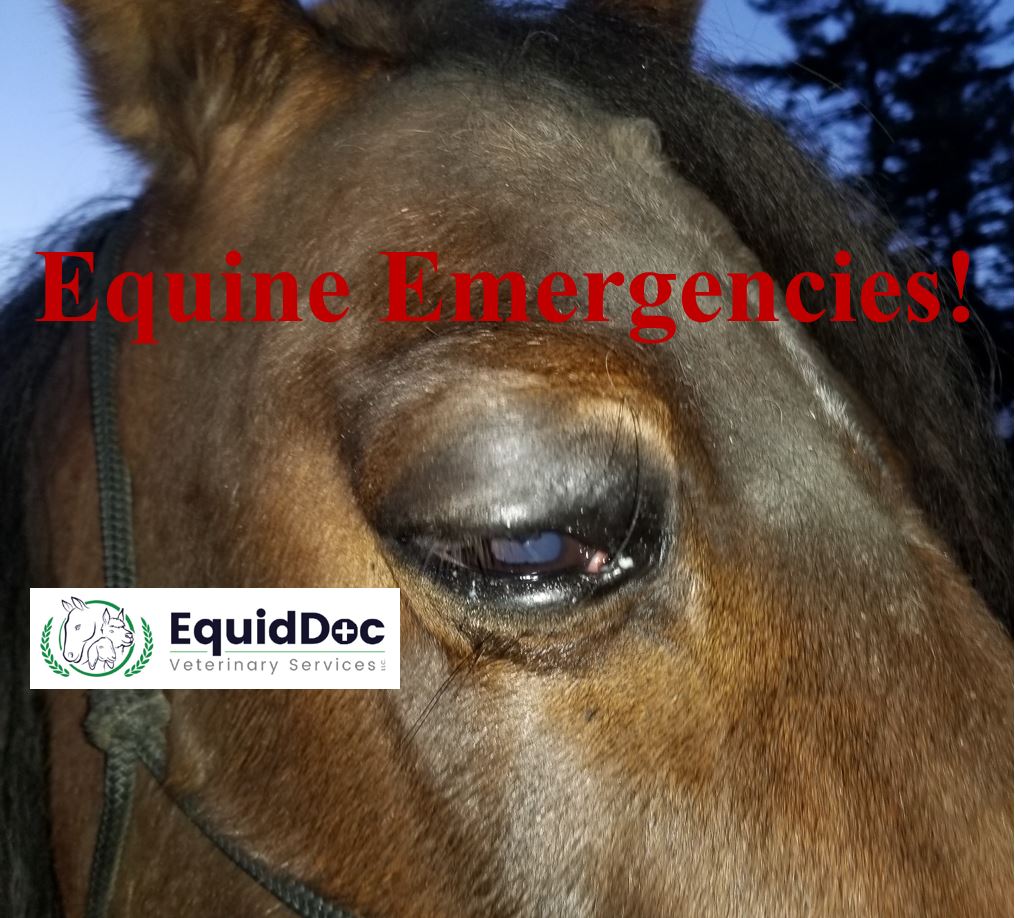It’s almost impossible to be a horse owner and not encounter the dreaded late-night emergency at some point in your horse’s life. Horses are prone to injury and illness due to a combination of bad luck and their evolution as long-limbed, deep-chested, prey animals. While a horse may go many years without requiring any medical attention outside of routine vaccinations and dentistry, it is only a matter of time before they will require an emergency visit from your veterinarian and, we want YOU to be prepared for what to look for, when to call, and what to do while waiting for your EquidDoc veterinarian to arrive.
The following are some of the most encountered emergency conditions that affect the horse. Some conditions are life-threatening, some conditions are not, and sometimes it is difficult to tell! Whenever you see your horse do sometimes outside their normal, a conversation with your EquidDoc veterinarian is both reasonable and encouraged. Office number 508-885-4205 (M-F 8:30-4:30) — After-hours and weekend emergency line 508-797-5921.
- Colic – Please call EquidDoc if you see any loss of appetite, decrease in or absence of manure, or outward signs of discomfort (pawing, flank watching, curling the upper lip, lying down, rolling, etc). While some causes of colic are transient and resolve with medical treatment on the farm, other forms of colic may be life-threatening and need prompt hospitalization or surgery for a successful outcome.
- Choke (aka esophageal obstruction) – Please call EquidDoc if your horse has food, saliva, or foam coming from their nose or mouth after eating, is seen to retch and cough frequently while trying to eat, or appears distressed with an outstretched neck. Some of these symptoms may resolve on their own, but if they continue beyond 15 minutes, please give EquidDoc a call. While a horse is “choked” they can breathe normally, but are unable to swallow food or drink water, risking dehydration, and most concerningly, aspiration pneumonia.
- Fever – Please call EquidDoc if you identify that your horse has a fever (a temperature reading of 101.5*F or greater in the horse, though any temperature > 101*F should raise suspicion). Anytime you see your horse lying down, not eating her food, or looking depressed, the animal’s temperature should be taken. Please always take your horse’s temperature before administering any Bute or Banamine on the farm, as these medications will lower the body’s temperature, and mask the presence of a fever. Horses develop fevers in cases of systemic inflammation or infection and should be promptly examined and treated.
- Respiratory – Please call EquidDoc for any sign of respiratory distress in your horse such as a significantly elevated respiratory rate or increased abdominal effort while breathing, any nasal discharge that isn’t thin/watery, or any persistent or uncharacteristic coughing. Some respiratory diseases are contagious and can quickly spread to other horses if not appropriately managed. If your horse has an infection or difficulty breathing, prompt treatment is necessary.
- Eyes – Please call EquidDoc if you observe any swollen, squinty, drippy, or cloudy eyes, or for any laceration to the eye or eyelids. Injury and disease affecting your horse’s eye can change and deteriorate quickly. Timely examination and treatment are essential in preserving vision and relieving pain.
- Lameness – Please call EquidDoc for any non-weight bearing or toe-touching lameness, with or without limb swelling, resistance in your horse to move or walk forward, as well as any uncoordinated or wobbly gait. While the cause for severe lameness is likely a routine hoof abscess, it is important to rule out other critical conditions such as a fractured bone, infected joint, or laminitis.

- Wounds and lacerations – Please call EquidDoc for any puncture, wound, or laceration that penetrates through the skin, no matter how small. Some lacerations require suturing for proper healing, tiny punctures over joints can lead to infected synovial structures (a life-threatening condition) and many wounds require thorough cleaning and antibiotics to prevent the development of local infection or cellulitis.
When you call your EquidDoc veterinarian, we will ask for a detailed description of what you are seeing, how long the horse has been affected, and any medical history, treatment, or medications that have been given up to that point. In some cases, we may recommend that you give a dose of Banamine or Bute while awaiting our arrival, but please wait to administer those medications until you have discussed it with the vet. If your horse can walk, please move them into a quiet enclosure or stall with good lighting where they can rest. Wounds or lacerations can be lightly cleaned with water and wrapped temporarily to keep clean and reduce swelling and bleeding until your EquidDoc vet arrives.
Whether you need to request an emergency visit, or just want to discuss a concern about your horse, never hesitate to call EquidDoc to speak with a veterinarian. We will help you determine if an emergency visit is best or if a routine office-hours appointment may be scheduled. For all medical concerns, and to inquire about our First Aid Kits for sale, please call the EquidDoc office at (508) 885-4205 or email office@equiddocvet.com. Our office is open M-F 8:30-4:30 – for all after-hours emergencies, please dial our emergency line at 508-797-5921 to be connected to the on-call veterinarian.

